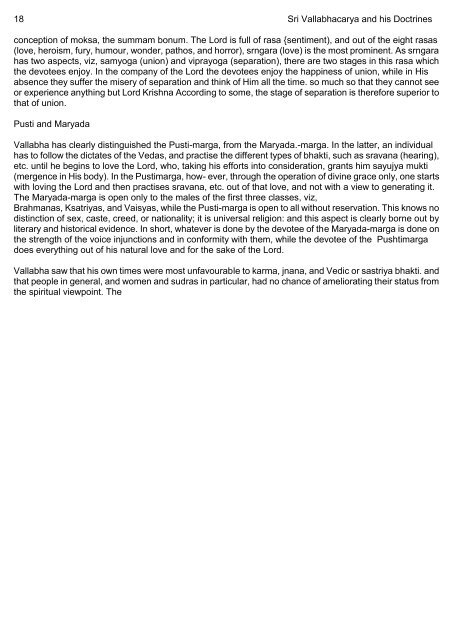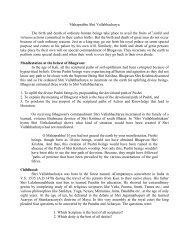Sri Vallabhacharya - Pushti Darshan
Sri Vallabhacharya - Pushti Darshan
Sri Vallabhacharya - Pushti Darshan
You also want an ePaper? Increase the reach of your titles
YUMPU automatically turns print PDFs into web optimized ePapers that Google loves.
18 <strong>Sri</strong> Vallabhacarya and his Doctrines<br />
conception of moksa, the summam bonum. The Lord is full of rasa {sentiment), and out of the eight rasas<br />
(love, heroism, fury, humour, wonder, pathos, and horror), srngara (love) is the most prominent. As srngara<br />
has two aspects, viz, samyoga (union) and viprayoga (separation), there are two stages in this rasa which<br />
the devotees enjoy. In the company of the Lord the devotees enjoy the happiness of union, while in His<br />
absence they suffer the misery of separation and think of Him all the time. so much so that they cannot see<br />
or experience anything but Lord Krishna According to some, the stage of separation is therefore superior to<br />
that of union.<br />
Pusti and Maryada<br />
Vallabha has clearly distinguished the Pusti-marga, from the Maryada.-marga. In the latter, an individual<br />
has to follow the dictates of the Vedas, and practise the different types of bhakti, such as sravana (hearing),<br />
etc. until he begins to love the Lord, who, taking his efforts into consideration, grants him sayujya mukti<br />
(mergence in His body). In the Pustimarga, how- ever, through the operation of divine grace only, one starts<br />
with loving the Lord and then practises sravana, etc. out of that love, and not with a view to generating it.<br />
The Maryada-marga is open only to the males of the first three classes, viz,<br />
Brahmanas, Ksatriyas, and Vaisyas, while the Pusti-marga is open to all without reservation. This knows no<br />
distinction of sex, caste, creed, or nationality; it is universal religion: and this aspect is clearly borne out by<br />
literary and historical evidence. In short, whatever is done by the devotee of the Maryada-marga is done on<br />
the strength of the voice injunctions and in conformity with them, while the devotee of the <strong>Pushti</strong>marga<br />
does everything out of his natural love and for the sake of the Lord.<br />
Vallabha saw that his own times were most unfavourable to karma, jnana, and Vedic or sastriya bhakti. and<br />
that people in general, and women and sudras in particular, had no chance of ameliorating their status from<br />
the spiritual viewpoint. The



